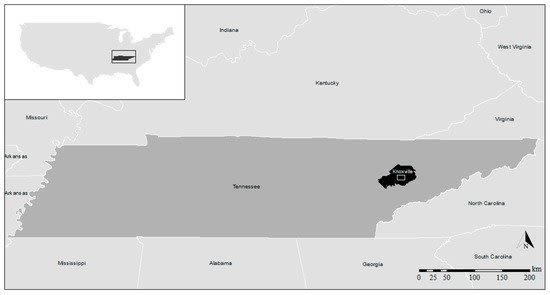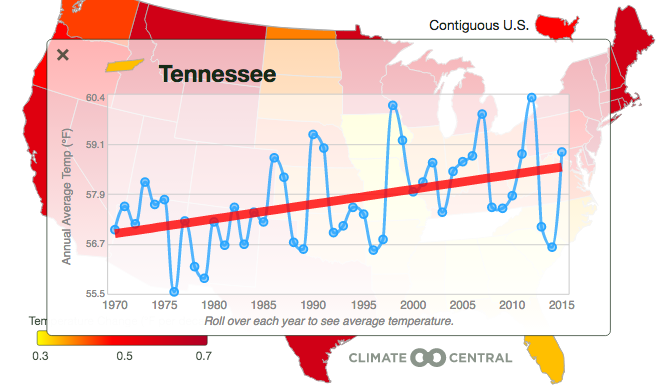Losing your belongings, Losing your mind
The long-term effects of Extreme Weather in Eastern Tennessee

Each year natural disasters strike and uproot many families from their homes, leaving them with nothing but the clothes on their back. The aftermath of hurricanes, tornados, floods are devastating, leaving many people with long-term suffering and PTSD. An evacuee of Hurricane Katrina in New Orleans in 2005, University of Tennessee’s Amy Blakely saw firsthand how these disasters can have a lifelong impact.
Blakely, her husband, and two toddlers evacuated to Honolulu and, from there, “watched Katrina destroy St. Bernard Parish, where we lived. We knew there was nothing we could do, and we couldn’t go back to NOLA.” Luckily for Blakley, she was relocating for her new job in Knoxville but, many Katrina victims weren’t as lucky. It has taken years for people to get their lives back together again after this disaster, many people were stranded in New Orleans with no family, no belongings, and nowhere to go, forced to start all over again.
After Katrina went back out to sea, Blakley recalls being told her old home in St. Bernard Parish took on 11 feet of water. Their possessions were destroyed, including her husband’s truck that floated away and was never found.
“Katrina was upsetting, I was scared, and I cried as I watched the TV news reports. We weathered the storm with no lasting mental or physical effects, but I know of people who did suffer mentally because of everything they lost.”
People who are stranded in situations like Hurricane Katrina are more likely to be the ones most affected by mental illness, losing everything that has value to them in a way can cause serious long-term damages to their mental health. The journal, Current Opinion in Psychology, states how depression, anxiety, and post-traumatic stress are the most common impacts of climate change. It’s a consequence of extreme weather we don’t often talk about, even though studies from climatologists, social workers, and social policy and health researchers show the correlation between the increase in suicide rates, depression, anxiety, and stress when extreme changes in climate occur.
According to the American Public Health Association, 49% of Hurricane Katrina Survivors developed a mental illness, 1 in 6 people developed PTSD. From this natural disaster, suicide and suicidal thoughts more than doubled.
There’s no way to predict who might suffer the consequences from extreme weather events – studies show increased levels of anxiety, PTSD, and depression in both people with and without a history of mental illness. The effects can stretch into the long term, according to University of South California’s Social Policy and Heath professor, Dr. Lawrence Palinka, who studies the effects of natural disasters on survivors.
Adult mental health in the United States compared to Tennessee. Source: National Survey on Drug Use and Health (NSDUH), SAMHSA
Adult mental health in the United States compared to Tennessee. Source: National Survey on Drug Use and Health (NSDUH), SAMHSA
“There are a number of different theories as to how the experience of life-threatening events can affect the brain,” Palinkas said in an interview, including the “release of cortisol that makes the heart beat faster to pump more oxygen throughout the body becomes exhausted.” This phenomenon can affect neural receptors which in the brain regulate mood, thus causing drastic behaviors that can lead to mental illnesses.
Natural disasters, he said, cause “a profound sense of loss of something valued,” which also commonly results in irregular moods and behaviors.
It doesn’t take a disaster to create a mental health consequence. Heat, according to Motivation for Heat Adaption, is actually the deadliest metrological hazard. In the Southeast specifically, there has been a drastic rise in temperatures along with a greater number of natural disasters such as tornadoes. University of Tennessee’s Geography professor Kelsey Ellis conducted a research study with Middle Tennessee State’s Geoscience professor Dr. Alisa Hass, studying unusual behavior and high temperatures in Tennessee. They uncovered that the longer warm session in the southeast, along with rise in excessive heat, increases the risk of exhaustion and dehydration, leading to greater exposure to mental health disorders.

Source: ClimateCentral
Source: ClimateCentral
“Heatwaves in Tennessee have grown to me more intense and the lack of resources in rural Tennessee areas is more likely to expose individuals to unusual behavior and heat-related side effects,” Ellis said in an interview. This unusual behavior causes a spike in anxiety and depression rates. “Most of the participants in his study were aware of a heat event, they were less aware of what adaption actions they should take. Only half of those surveyed changed their behavior because of the heat,” according to the study. Despite the negative effects of extreme weather, many individuals disregard the severity of weather-related illnesses.
Chattanooga, Tennessee is the 6th fastest-warming city in the United States. Source: ClimateChange
Chattanooga, Tennessee is the 6th fastest-warming city in the United States. Source: ClimateChange
People with pre-existing medical conditions, and low-income populations, are the most vulnerable to mental health disorders. Access to care, and the ability to pay for it, affects individuals’ resilience. According to the National Health Security Preparedness Index, Tennessee meets the national average in the category of overall preparedness, but in mental health they rank very low. Under the healthcare delivery category, the national average is 4.9, under this group falls mental healthcare where Tennessee ranks as a 3.4. Tennessee falls significantly below the average in access and preparedness in treating those with mental illness, making this region the most vulnerable.
It is important to acknowledge this correlation because as the threat of climate change increase so will the effects of mental illness and it cannot continue to be ignored. The rates of anxiety, depression, PTSD, and other disorders rise, and it is displayed throughout increase patient intake at medical centers. It has been shown that the number of visits tend to increase with increasing temperature.
According to a psychiatric study, Relationship between Ambient Temperature and Visits to Mental Health Emergency Departments, shows the use of emergency rooms has increased for mental and psychosocial problems throughout the last decade and coincides with increase of climate change.
To start the battle against mental illness, it is important to spread awareness and expressing how important it is to increase accessibility to mental health treatment. The BlueCross BlueShield of Tennessee Health Foundation is helping fight the battle against mental illness, donating $85,000 to Mental Health America of Middle Tennessee to train first repsonders in reconizing and helping with mental illness.
To suppress the relationship between extreme weather and mental disorders, being more cautious of climate change and more environmentally aware is an important. As climate change continues so will the rise in mental health disorders. This is the beginning in solving a very complex problem, playing your role in helping the environment while educating others on the susceptible of mental illness will positively impact your community.




